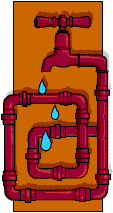Pennsylvania's Hot Water War
Created | Updated Apr 26, 2011

In May 1797, President John Adams and his Congress needed to raise $2 million in taxes and imposed a levy on houses, land and, therefore, slaves. Each state had a certain share to pay to the federal government and Pennsylvania's portion amounted to $250,000.
Since very few Pennsylvanians owned slaves the money was raised by taxing the value of houses and lands owned by a person. Federal assessors decided the best way to determine the value of a house was to count the number and size of its windows.
Everything was moving along smoothly until the assessors reached the eastern part of Pennsylvania, specifically Bucks, Lehigh, Montgomery, and Northampton counties. These areas were populated predominantly by German immigrants and the window tax reminded them of the hearth tax levied by the kings of the German states.
These Pennsylvania-German women showed their opposition by pouring hot water from second-floor windows upon tax assessors counting windows on the ground. This act of rebellion was carried out across the counties, giving the uprising the nickname the 'Hot Water War'.
The men of the area rallied around John Fries, a veteran of the Revolutionary War. At a public meeting held in Klein's Tavern in Quakertown in 1798, Fries threatened to raise an army to fight the new tax. Undaunted, the assessors went about their business until Fries' 60-man army, dressed in their old Revolutionary War uniforms, chased them away.
In March 1798, Pennsylvania governor Thomas Mifflin sent the state militia from Reading to help round up the tax resisters, placing them under arrest in the Sun Inn in Bethlehem under guard of some federal marshals. When the news reached Fries, he led a mob of 140 men to break the resisters out. A company of infantry from Northampton and a troop of cavalry from Macungie joined him along the way.
On the morning of 7 March, 1798, the six federal marshals and 14 state militiamen found themselves surrounded by an armed group of more than 400. Fries entered the inn and successfully negotiated the release of the prisoners. With that, the rebels disbanded and returned home without a shot being fired.
The marshals returned to Philadelphia, which was the capital of the United States at the time, and reported what had happened directly to President Adams. Adams responded by calling out 1,000 militiamen to converge on the area and arrest the ringleaders.
Fries escaped capture until April when some soldiers followed his dog to Rich Hill, near Sellersville, where they found the rebel leader hiding in the bushes.
Fries was tried for treason, found guilty and sentenced to be hanged in Bucks County. A week later, the conviction was overturned because of bias in the jury and a new trial was ordered. Before the new trial, Fries' three lawyers all quit the case and, without the aid of counsel, Fries was convicted and sentenced to death again.
Forty-one others were also tried and convicted for offences such as tax evasion and obstruction of justice, but the majority were sentenced to death on treason charges. There was a great public outcry and with sentiment siding with Fries, President Adams pardoned all the rebels on death row on 21 May, 1800 - two days before Fries was scheduled for hanging.
Fries returned home a broken man and died 19 years later.

